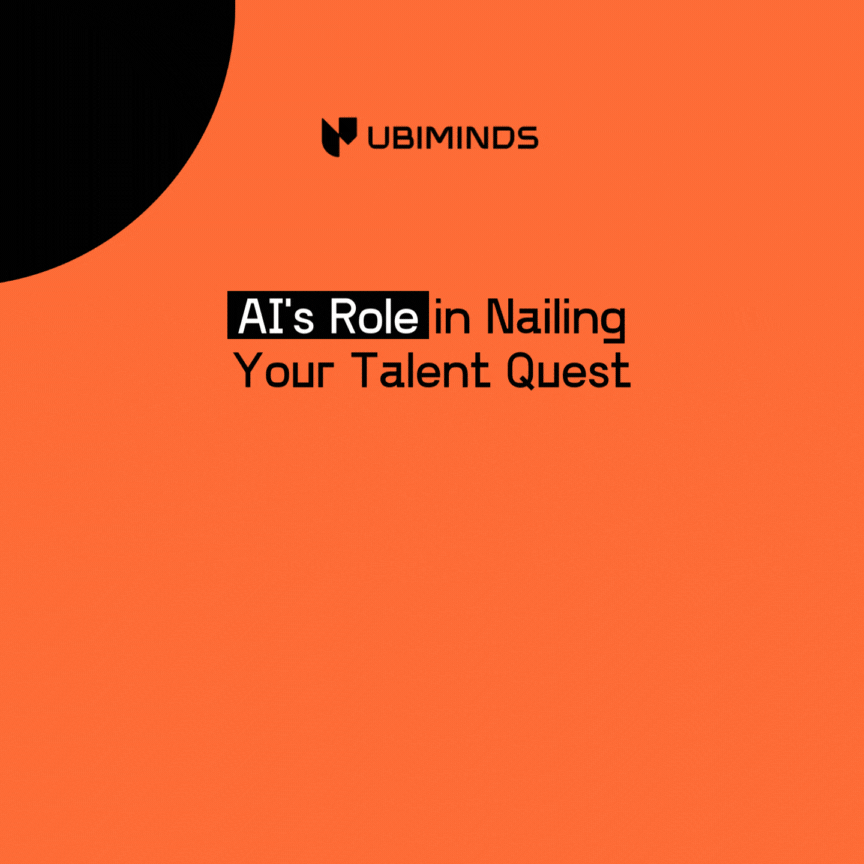Artificial Intelligence (AI) is now aiding tech recruiters in pinpointing qualified candidates seamlessly aligned with the intricate needs of software teams. Explore how AI strategies refine candidate selection, ensuring a precise match between skills and evolving product development demands. AI-driven tools play a crucial role in this process.
Content
TL./DR.: What You Should Know About AI Use in Tech Recruiting
Too busy to read the full post? Here’s our 20-second visual summary to send you on your way:

#1 AI’s Role in Targeted Candidate Search
AI-powered tools offer precision in candidate searches by Refining Candidate Searches, and Allowing Predictive Analysis in Talent Mining.
Refining Candidate Searches When HeadHunting
Tools like LinkedIn Talent Insights and Entelo use AI to analyze extensive datasets, pinpointing technical skills and experiences crucial for software roles in professional profiles. For instance, using these tools, recruiters can narrow down searches for software engineers proficient in specific tech stacks.
AI-powered tools play a crucial role at Ubiminds in streamlining the targeted candidate search process. Here’s how:
- Helping us Choose the Best Target Audience. Leveraging market intelligence, our AI tools analyze extensive datasets to identify the most suitable companies and individuals. This guides our recruitment strategy, ensuring we focus on the most promising candidates within the software industry.
- Fine-tuning our Pitch for Candidates. Our AI algorithms assist in fine-tuning our pitch to candidates. By identifying key selling points that resonate with each candidate, we customize our messaging for maximum impact. This tailored approach enhances candidate engagement and increases the likelihood of successful recruitment.
At Ubiminds, our AI-driven strategies refine candidate searches and contribute to a more efficient and personalized recruitment process. Thanks to AI’s marketing intelligence, we can identify key personas and tailor outreach for maximum impact. AI-driven campaigns engage candidates, augmenting inbound traffic and diversifying talent pools.
Predictive Analysis in Talent Mining
Candidate Database Platforms utilize machine learning to predict candidate suitability. They evaluate past job performances and learning patterns to predict a candidate’s potential success in a software team. This approach identifies individuals with both technical skills and long-term potential for roles like software development managers or tech leads.
At Ubiminds, like other firms aligning tech talent with software companies, we face the ongoing challenge of analyzing extensive content from resumes and interviews… a task often overwhelmed by sheer data volume.
How AI Enhances Our Process:
Using our Applicant Tracking System (ATS), we perform targeted searches to pinpoint high-quality candidates aligned with the desired profile.
- We can categorize and rank our basic pool of candidates based on motivation, skill level, and personal preferences.
- We can identify which individuals progressed through various recruitment stages. Most importantly, gain insights into reasons for attrition — be they internal, external, or anything in between.
- Not only that, but we discern patterns in the hiring of individuals per each client company. This allows us to know who is best for which job opportunity, accommodating each company’s culture and individual’s personal values.
Essentially, AI pre-screens candidates, ensuring a meticulous assessment of cultural fit and engagement before client rounds.
#2 AI’s Role in Improving Candidate Engagement and Experience
So you may wonder: does this dehumanize our processes? We are experimenting and learning as we go, but so far, it seems it makes talent acquisition more fair (and less time-consuming) to candidates.
AI-driven technologies enhance candidate engagement by improving FAQ generation, Personalized Communication, and Interview Preparation and Scheduling.
FAQ Generation from Company Insights
Utilizing AI, Ubiminds crafts insightful FAQs gleaned from company data. This empowers candidates with in-depth knowledge, offering a comprehensive understanding of roles and the company’s vision.
- Generates actionable data. AI transcribes interviews, analyzes patterns, and extracts data, enriching candidate profiles, and even complementing them with information that recruiters might have missed.
- Supports the development of support collaterals. It captures, analyzes, summarizes, groups, and organizes answers to recurrent queries collected across multiple interviews and messages for the same job position.
Personalized Communication
AI-powered chatbots such as XOR facilitate personalized candidate interactions. For instance, Mya uses natural language processing to engage with candidates, providing information about job descriptions or interview schedules. These automated tools maintain candidate engagement by offering instant and tailored responses.
At Ubiminds, the use of AI also allows for better Candidate Support Services with Automessaging.
- Make it Efficient: AI automates messaging, expediting personalized outreach and follow-ups.
- Make it Relevant: Ensures regular, meaningful contact with candidates without overwhelming them with spam.
Interview Preparation and Scheduling
AI facilitates simulated interviews and offers interview preparation tools, enhancing candidate readiness. Scheduling assistants manage emails, replies, and meeting schedules, ensuring a seamless experience. Here, the role in interview preparation and scheduling is two-fold:
| For Recruiters | For Candidates |
|---|---|
| Especially useful for non-technical recruiters, AI can run simulations to help them gain experience and proficiency. It provides guidance on what questions to ask and what answers to expect, thereby enhancing the training of our team. Tools like Supernormal transcribe, summarize, and set up for other AI processes. This kind of aid ensures key points and action items are validated and not lost in the ATS. | AI provides insights for a more efficient and tailored preparation process, contributing to a better interview experience. AI optimizes resumes for specific job positions. Facilitates interview simulation and training by comparing job prompts, objectives, interviewer's CV, and candidate's CV. |
Data-Driven Decision-Making
Tools like Ideal’s AI for Recruiting analyze candidate behavior during the recruitment journey. This data assists recruiters in modifying strategies to enhance candidate attraction and retention. For example, Ideal’s AI identifies patterns in candidate responses, aiding recruiters in refining outreach strategies for software developer roles.
#3 AI’s Role in Fostering Diversity and Inclusion Efforts
AI plays a crucial role in promoting diversity within software teams by:
Bias Reduction Crafting Job Descriptions
AI platforms like Textio analyze job descriptions, highlighting biased language that might deter diverse candidates. By offering suggestions to neutralize language biases, Textio assists in creating inclusive job postings that appeal to a broader talent pool. By aligning language and culture, these descriptions allure the right talent while fostering a diverse applicant pool.
Diverse Candidate Sourcing
Tools such as SeekOut uses AI algorithms to broaden candidate sourcing across various demographics. For instance, SeekOut’s AI-based search assists recruiters in finding candidates from diverse backgrounds, expanding the potential for assembling an inclusive software development team.
At Ubiminds, AI’s Role in Fostering Diversity and Inclusion Efforts played out in 3 fronts:
- 1. Calibrating Analyses vs. Recruiter’s Biases. AI allows Ubiminds to standardize analyses, reducing the impact of recruiter biases and prejudices.
- 2. Standardizing English proficiency Assessments, ensuring a consistent evaluation for all candidates. This removes individual biases, ensuring everyone meets the same ESL standards.
- 3. Enabling Process Scalability with Consistency. Even in error correction, immediate adjustments can be applied to the whole process. Thus, we avoid the need to retrain the entire team or implement a smaller rollout.
- 4. Maintaining Consistency in Treatment. The machine remains unaffected by variables like fatigue, mood, or other emotional factors. The process doesn’t halt by the recruiter’s context, guaranteeing continuity and efficiency.
Ultimately, integrating AI in tech recruitment transforms the process, enabling recruiters to make informed decisions and foster diverse software teams.
Embracing AI: Ubiminds’ Approach
Yes, our boutique staff augmentation service integrates cutting-edge AI tools while preserving the human touch in our recruitment strategies. We believe in leveraging technology to handle the heavy lifting, freeing up more time to strategize on assisting U.S. tech companies in hiring software engineers in Latin America.
Connect with us to learn more and revolutionize your recruitment journey by offering seamless and personalized candidate experience in the hiring process for product, design, and engineering roles:
We’re happy to share how our AI-driven strategies enhance candidate selection, optimize team collaboration, and contribute to your recruitment process. Explore the synergy of integrating advanced technology with a human-centered approach! You’ll be surprised by the impact it can have both in staffing and in-house talent acquisition.





